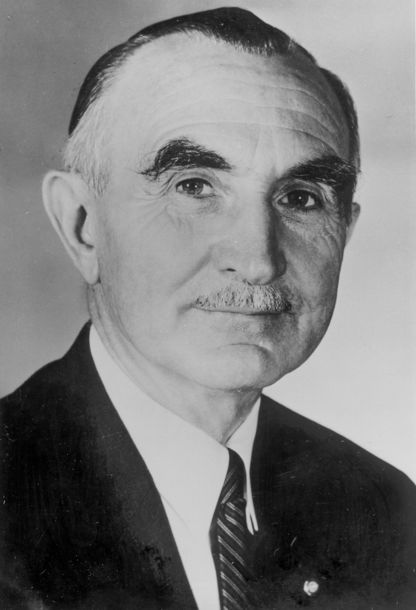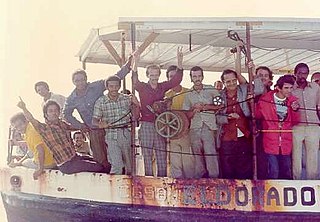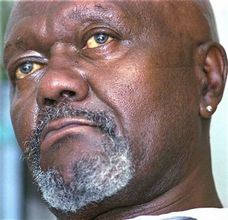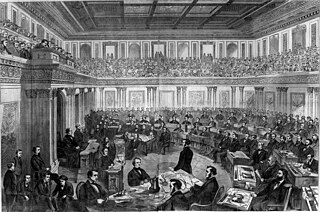This is a list of United States citizens who have been granted political asylum in Cuba.
House Concurrent Resolution 254, passed in 1998, put the number at 90. [1] One estimate, c. 2000, put the number at approximately 100. [2]
| Contents |
|---|
Rogue state or outlaw state is a term applied by some international theorists to states they consider threatening to the world's peace. This means being seen to meet certain criteria, such as being ruled by authoritarian or totalitarian governments that severely restrict human rights, sponsoring terrorism and seeking to proliferate weapons of mass destruction. The term is used most by the United States, and in his speech at the United Nations (UN) in 2017, Donald Trump reiterated this phrase. However, it has been applied by other countries as well.

The Spanish–American War was an armed conflict between Spain and the United States in 1898. Hostilities began in the aftermath of the internal explosion of USS Maine in Havana Harbor in Cuba, leading to U.S. intervention in the Cuban War of Independence. The war led to emergence of U.S. predominance in the Caribbean region, and resulted in U.S. acquisition of Spain's Pacific possessions. That led to U.S. involvement in the Philippine Revolution and ultimately in the Philippine–American War.

Assata Olugbala Shakur is a former member of the Black Liberation Army, who was convicted of the first-degree murder of State Trooper Werner Foerster during a shootout on the New Jersey Turnpike in 1973. Shakur was also the target of the FBI's COINTELPRO directed towards Black Liberation groups and activists.
Elián González Brotons is a Cuban citizen who, as a young boy in 2000, became embroiled in a heated international custody and immigration controversy involving the governments of Cuba and the United States; his father, Juan Miguel González Quintana; his other relatives in Cuba and in Miami, Florida; and Miami's Cuban-American community.

Jesse Alexander Helms Jr. was an American politician and a leader in the conservative movement. He served from 1973 until 2003, and was elected five times as a Republican to the United States Senate from North Carolina. As chairman of the Senate Foreign Relations Committee from 1995 to 2001 he had a major voice in foreign policy. Helms helped organize and fund the conservative resurgence in the 1970s, focusing on Ronald Reagan's quest for the White House as well as helping many local and regional candidates.

Leroy Eldridge Cleaver was an American writer, and political activist who became an early leader of the Black Panther Party.

Hamilton Fish was an American politician who served as the 16th Governor of New York from 1849 to 1850, a United States Senator from New York from 1851 to 1857 and the 26th United States Secretary of State from 1869 to 1877. Fish is recognized as the "pillar" of the presidency of Ulysses S. Grant and considered one of the best U.S. Secretaries of State by scholars, known for his judiciousness and efforts towards reform and diplomatic moderation. Fish settled the controversial Alabama Claims with Great Britain through his development of the concept of international arbitration. Fish kept the United States out of war with Spain over Cuban independence by coolly handling the volatile Virginius Incident. In 1875, Fish initiated the process that would ultimately lead to Hawaiian statehood, by having negotiated a reciprocal trade treaty for the island nation's sugar production. He also organized a peace conference and treaty in Washington D.C. between South American countries and Spain. Fish worked with James Milton Turner, America's first African American consul, to settle the Liberian-Grebo war. President Grant said he trusted Fish the most for political advice.

Wayne Lyman Morse was an American attorney and United States Senator from Oregon, known for his proclivity for opposing his party's leadership, and specifically for his opposition to the Vietnam War on constitutional grounds.

The Mariel boatlift was a mass emigration of Cubans, who traveled from Cuba's Mariel Harbor to the United States between 15 April and 31 October 1980. The term "Marielito" is used to refer to these refugees in both Spanish and English. While the exodus was triggered by a sharp downturn in the Cuban economy, it followed on the heels of generations of Cubans, who had emigrated to the United States in the preceding decades to search for political freedom and economic opportunities.

Robert Menendez is an American politician serving as the senior United States Senator from New Jersey, a seat he has held since 2006. A member of the Democratic Party, he was first appointed to the U.S. Senate by Governor Jon Corzine, and was later elected Chair of the United States Senate Committee on Foreign Relations in January 2013. He stepped down from that post in April 2015 upon being indicted on federal corruption charges.

Robert Franklin Williams was an American civil rights leader and author best known for serving as president of the Monroe, North Carolina chapter of the NAACP in the 1950s and into 1961. He succeeded in integrating the local public library and swimming pool in Monroe. At a time of high racial tension and official abuses, Williams promoted armed black self-defense in the United States. In addition, he helped gain support for gubernatorial pardons in 1959 for two young African-American boys who had received lengthy reformatory sentences in what was known as the Kissing Case of 1958. It generated national and international attention and criticism of the state.

The Black Power movement emphasized racial pride, economic empowerment, and the creation of political and cultural institutions for African-American people in the United States.

Cuba, officially the Republic of Cuba, is a country comprising the island of Cuba as well as Isla de la Juventud and several minor archipelagos. Cuba is located in the northern Caribbean where the Caribbean Sea, Gulf of Mexico and Atlantic Ocean meet. It is east of the Yucatán Peninsula (Mexico), south of both the U.S. state of Florida and the Bahamas, west of Haiti and north of both Jamaica and the Cayman Islands. Havana is the largest city and capital; other major cities include Santiago de Cuba and Camagüey. The area of the Republic of Cuba is 110,860 square kilometers (42,800 sq mi). The island of Cuba is the largest island in Cuba and in the Caribbean, with an area of 105,006 square kilometers (40,543 sq mi), and the second-most populous after Hispaniola, with over 11 million inhabitants.

Cuba–United States relations are bilateral relations between the Republic of Cuba and the United States of America. Cuba and the United States restored diplomatic relations on 20 July 2015, relations which had been severed in 1961 during the Cold War. U.S. diplomatic representation in Cuba is handled by the United States Embassy in Havana, and there is a similar Cuban Embassy in Washington, D.C. The United States, however, continues to maintain its commercial, economic, and financial embargo, making it illegal for U.S. corporations to do business with Cuba.

The United States recognizes the right of asylum for individuals as specified by international and federal law. A specified number of legally defined refugees are admitted annually. These refugees are not eligible to apply for asylum from inside the U.S. but have applied for refugee status through the United Nations. Refugees compose about one-tenth of the total annual immigration to the United States, though some large refugee populations are very prominent.

William Lee Brent was an American member of the Black Panther Party and defector, best known for hijacking a passenger jet and diverting it to Cuba in 1969, where he spent the last 37 years of his life in exile.

The impeachment of Andrew Johnson was initiated on February 24, 1868, when the United States House of Representatives resolved to impeach Andrew Johnson, the 17th president of the United States, for "high crimes and misdemeanors," which were detailed in 11 articles of impeachment. The primary charge against Johnson was violation of the Tenure of Office Act, passed by Congress in March 1867, over his veto. Specifically, he had removed from office Edwin M. Stanton, the secretary of war—whom the act was largely designed to protect—and attempted to replace him with Brevet Major General Lorenzo Thomas.

The presidency of William McKinley began on March 4, 1897, when William McKinley was inaugurated and ended with his death on September 14, 1901. He is best known for leading the nation to victory in the Spanish–American War (1898), taking ownership of the Republic of Hawaii, purchasing the Philippines, Guam and Puerto Rico. It includes the 1897 Dingley Tariff to protect manufacturers and factory workers from foreign competition, and the Gold Standard Act of 1900 that rejected free silver inflationary proposals. Rapid economic growth and a decline in labor conflict also marked the presidency.
Americans in Cuba consist of expatriates and immigrants from the United States as well as Cubans of American descent. As of September 1998, there are about 2,000 to 3,000 Americans living in Cuba.